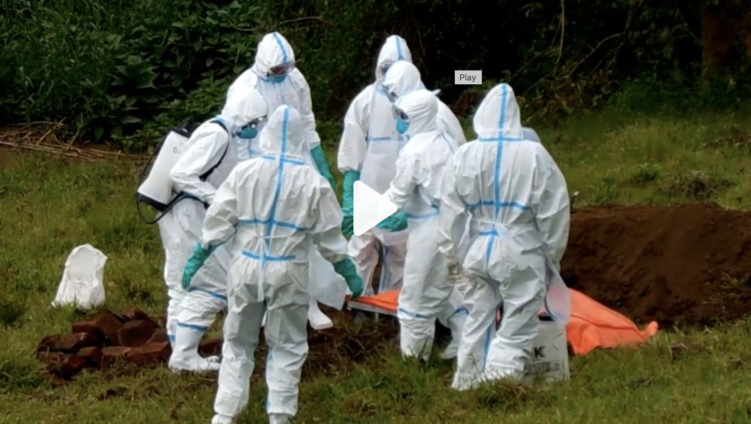Ugandan President Yoweri Museveni has declared an immediate three-week lockdown in two high-risk districts as the country battles a rise in Ebola infections.
All movement in and out of the Mubende and Kassanda districts will be halted, Museveni said in a televised address on Saturday – although cargo trucks will be allowed to enter and leave the areas.
Curfews will also be imposed. Places of worship, bars, gyms, saunas and other entertainment venues will close but schools will remain open, he added.
“Given the gravity of the problem and to prevent further spread and protect lives and livelihoods, the government is taking extra measures that require action from all of us,” Museveni said.
The Ugandan health ministry will also increase contact tracing and assistance to local health facilities.
Ebola is a rare but deadly disease. It spreads through direct contact with body fluids and is not transmitted through airborne viral particles, the US Centers for Disease Control and Prevention (CDC) says.
It has no cure, and there is no approved vaccine, although there is a concerted effort to create one.
Speaking at a media briefing earlier this month, World Health Organisation Director-General Tedros Adhanom Ghebreyesus said the vaccines used successfully to curb recent Ebola outbreaks in the Democratic Republic of the Congo are not effective against the type of Ebola virus now circulating in Uganda.
“However, several vaccines are in various stages of development against this virus, two of which could begin clinical trials in Uganda in the coming weeks, pending regulatory and ethics approvals from the Ugandan government,” said Tedros.
Uganda has experienced four Ebola outbreaks. The deadliest left more than 200 people dead in 2000.
Museveni declared an Ebola outbreak in September after a case of the relatively rare Sudan strain was confirmed and cases began to rise across districts.
The latest outbreak has so far killed 29 amid 63 recorded cases.
According to the CDC, a person infected with Ebola “is not contagious until symptoms appear (including fever, headache, muscle and joint pain, fatigue, loss of appetite, gastrointestinal symptoms, and unexplained bleeding).”
The virus spreads through direct contact with body fluids and is not transmitted through airborne viral particles, the CDC says.
Latest Stories
-
Guinea’s ex-military ruler pardoned over stadium massacre
16 minutes -
Foster confirmation of MMDCEs – V/Regional Minister appeals to chiefs
27 minutes -
Sale of diplomatic properties in Nigeria, Zambia by previous administration cancelled – Ablakwa
1 hour -
Maternal and newborn health crisis worsens as late referrals surge
2 hours -
Farmer fined GH₵4,800 for stealing 5 sacks of ginger
2 hours -
Playback: The Law discussed Article 146 – prima facie
3 hours -
Appeal Court judge slams weak enforcement of Land Act as land disputes dominate court cases
3 hours -
Police arrest two suspects for robbery at Ashaiman
3 hours -
Fire ravages apartments, stores at Akyem Kwabeng
4 hours -
Tano Anwia’s concession owner teams up with Forestry Commission to combat galamsey
4 hours -
Gov’t allocates GH₵490m to Education Ministry
5 hours -
Tragedy: Nigerian boxer dies after Ghana Pro League bout
5 hours -
Opoku-Agyemang undergoes treatment at UGMC, set to receive further care abroad
8 hours -
The mystery of Bomigo: an island of divine laws, sacred goats, and unwavering traditions
10 hours -
Government’s GH₵ 292.4 million mistake: why free sanitary pads are the problem, not the solution
10 hours

